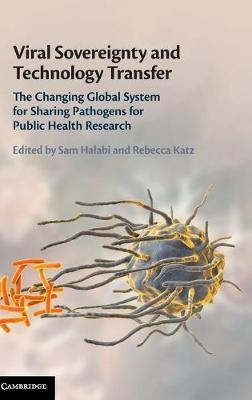
Viral Sovereignty and Technology Transfer
Cambridge University Press (Verlag)
978-1-108-48472-5 (ISBN)
In the global infectious-disease research community, there has long been uncertainty about the conditions under which biological resources may be studied or transferred out of countries. This work examines the reasons for that uncertainty and shows how global biomedical research has been shaped by international disputes over access to biological resources. Bringing together government leaders, World Health Organization officials, and experts in virology, wildlife biology, clinical ethics, technology transfer, and international law, the book identifies the critical problems - and implications of these problems - posed by negotiating for access and sharing benefits, and proposes solutions to ensure that biomedical advances are not threatened by global politics. Written in accessible, non-technical language, this work should be read by anyone who sees global health and biomedical research as a priority for international lawmakers.
Sam Halabi is the Manley O. Hudson Professor of Law at the University of Missouri. He is also a Scholar at the O'Neill Institute for National and Global Health Law and affiliated faculty at the Center for Global Health Science and Security at Georgetown University. His previous books include Global Management of Infectious Disease after Ebola, Intellectual Property and the New International Economic Order, and Food and Drug Regulation in an Era of Globalized Markets. He is also the co-chair (with Gian Luca Burci) of the Ethical, Legal, and Social Implications Committee of the Global Virome Project. Professor Halabi was the 1999 First Place Prize recipient of the Elie Wiesel Foundation for Humanity Essay in Ethics prize. Dr. Rebecca Katz is a Professor and Director of the Center for Global Health Science and Security at Georgetown University. Prior to coming to Georgetown, she spent ten years at The George Washington University as faculty in the Milken Institute School of Public Health. Her research is focused on global health security, public health preparedness and health diplomacy. Since 2007, much of her work has been on the domestic and global implementation of the International Health Regulations. From 2004-2019, Dr. Katz was also a consultant to the Department of State, working on issues related to the Biological Weapons Convention, pandemic influenza and disease surveillance.
Introduction: Viral Sovereignty, Technology Transfer, and the Changing Global System for Sharing Pathogens for Public Health Research Sam Halabi and Rebecca Katz; Part I. The Geopolitical, Historical, and Scientific Context: 1. The History of Accessing and Sharing Human Pathogens for Public Health Research Michelle Rourke; 2. Attitudes towards transfers of human research samples across borders: A multi-country perspective Ben Krohmal; 3. The Scope of Global Infectious Disease Research: Field Capture, Quarantine, and Sample Transfer to Detect Emerging Pathogen Threats Brian Bird; Part II. Health Security, Research Ethics, and Human Rights Implications; 4. The Ethics of Conducting Genomic Research in Low-Resource Settings Hayley K. Sullivan and Benjamin E. Berkman ; 5. The Ethics of Human Pathogen Research during Public Health Emergencies in Low- and Middle Income Countries: Lessons from Latin America and the Caribbean Sam Halabi; 6. Biosecurity, Biosafety and the Management of Dangerous Pathogens for Public Health Research Joshua Teperowski Monrad and Rebecca Katz; 7. Human Rights Implications of Pathogen Sharing and Technology Transfer Alexandra Phelan; Part III. Solutions; Standard Material Transfer Agreements, Repositories, and Specialized International Instruments: 8. Material Transfer Agreements and the Regulation of the Collaborative Environment Sherry Brett-Major; 9. Sharing of Biological Samples during Public Health Emergencies: Challenges and Opportunities for National and International Action Maria Julia Marinissen, Ruvani Chandrasekera, John Simpson, Theodore Kuschak, and Lauren Barna; 10. Facilitating Material Transfer Agreements from a Practitioner's Perspective Michael Mowatt and Mukul Ranjan; 11. The Pandemic Influenza Preparedness Framework as an Access and Benefit Sharing Mechanism Anne Huvos, Steven A. Solomon and Claudia Nannini; Conclusion Gian Luca Burci.
| Erscheinungsdatum | 03.06.2020 |
|---|---|
| Zusatzinfo | Worked examples or Exercises; 4 Maps |
| Verlagsort | Cambridge |
| Sprache | englisch |
| Maße | 160 x 235 mm |
| Gewicht | 500 g |
| Themenwelt | Recht / Steuern ► EU / Internationales Recht |
| Recht / Steuern ► Öffentliches Recht ► Völkerrecht | |
| Recht / Steuern ► Wirtschaftsrecht ► Urheberrecht | |
| Recht / Steuern ► Wirtschaftsrecht ► Wettbewerbsrecht | |
| ISBN-10 | 1-108-48472-7 / 1108484727 |
| ISBN-13 | 978-1-108-48472-5 / 9781108484725 |
| Zustand | Neuware |
| Haben Sie eine Frage zum Produkt? |
aus dem Bereich


